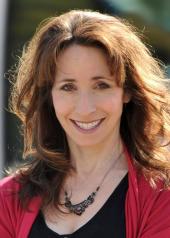By Nina Bai

This illustration, created at the Centers for Disease Control and Prevention (CDC), reveals ultrastructural morphology exhibited by coronaviruses. A novel coronavirus, named Severe Acute Respiratory Syndrome coronavirus 2 (SARS-CoV-2), was identified as the cause of an outbreak of respiratory illness first detected in Wuhan, China in 2019. The illness caused by this virus has been named coronavirus disease 2019 (COVID-19). [Photo: CDC/Alissa Eckert, MS; Dan Higgins, MAM]
As cases of the novel coronavirus infection, COVID-19, increase across the U.S., many people may be feeling anxious. UC San Francisco psychologist Elissa Epel, PhD, who studies stress, shared some thoughts about the difference between anxiety and panic, and steps you can take to prevent panic and be prepared.
Some anxiety is normal, but our anxious minds can easily go into panic mode
“The good news about the widespread anxiety is that it is fueling big changes fast—many people in affected areas are being very careful to limit exposure. Anxiety fosters prevention and safeguarding behaviors. Prevention reduces anxiety,” said Epel
“However, when threats are uncertain, such as the current coronavirus situation, our anxious minds can easily overestimate the actual threat and underestimate our ability to cope with it.” Epel noted that people with pre-existing anxiety conditions are particularly vulnerable.
"While some anxiety helps us cope, extreme anxiety can become coronavirus panic. When we are in a panic state, we suffer, we stress out our children, we are more likely to make mistakes and engage in irrational decisions and behavior,” said Epel. Panic can create new problems, such as overbuying that creates supply chain shortages of masks and sanitizers, and xenophobia toward certain groups.
Keep in mind that your anxiety influences those around you, said Epel. “Too much anxiety creates emotion contagion and spreads panic. That’s not helpful.”
Children will naturally have questions about the coronavirus, said Epel, and she pointed to resources to help you talk to your children and help them manage their own anxiety.
Limit media exposure and stick with reliable sources
“It’s tempting to check for updates, but checking several times a day can keep us in an escalated state of anxiety,” said Epel. “We then easily transmit that type of exaggerated anxiety to our children and those around us.” Focusing on catastrophic thoughts and predictions, especially given the examples on social media, can fuel panicky feelings.
Instead, she advises sticking to reliable sources of coronavirus information such as the U.S. Centers for Disease Control and Prevention (CDC).
Be informed about the key safety precautions, and be supportive to others, helping them think more calmly about it.
Reduce anxiety by reducing your risk
“Don’t feel silly or embarrassed about taking reasonable precautions,” said Epel. For example, follow the safety advice from the CDC, such as frequent handwashing; stay home if you don’t feel well; get enough sleep and take good care of your immune system. “Preparing a plan for the future, such minimizing exposure to large crowds, makes sense and can help reduce anxiety,” said Epel.
“During this uncertain time, it’s important to keep up your self-care routine, or even add something to it, to reduce your somatic anxiety, the anxiety we store up in our bodies,” said Epel. Consider what helps you most, such as taking a walk in nature, meditating, exercising, or talking to a friend.
“Make time to step back from screens, and make sure to connect with people about things other than just this issue,” said Epel.
About UCSF Psychiatry
The UCSF Department of Psychiatry, UCSF Langley Porter Psychiatric Hospital, and the Langley Porter Psychiatric Institute are among the nation's foremost resources in the fields of child, adolescent, adult, and geriatric mental health. Together they constitute one of the largest departments in the UCSF School of Medicine and the UCSF Weill Institute for Neurosciences, with a mission focused on research (basic, translational, clinical), teaching, patient care, and public service.
UCSF Psychiatry conducts its clinical, educational and research efforts at a variety of locations in Northern California, including UCSF campuses at Parnassus Heights, Mission Bay and Laurel Heights, UCSF Medical Center, UCSF Benioff Children's Hospitals, Zuckerberg San Francisco General Hospital and Trauma Center, the San Francisco VA Health Care System, and UCSF Fresno.
About the UCSF Weill Institute for Neurosciences
The UCSF Weill Institute for Neurosciences, established by the extraordinary generosity of Joan and Sanford I. "Sandy" Weill, brings together world-class researchers with top-ranked physicians to solve some of the most complex challenges in the human brain.
The UCSF Weill Institute leverages UCSF’s unrivaled bench-to-bedside excellence in the neurosciences. It unites three UCSF departments—Neurology, Psychiatry, and Neurological Surgery—that are highly esteemed for both patient care and research, as well as the Neuroscience Graduate Program, a cross-disciplinary alliance of nearly 100 UCSF faculty members from 15 basic-science departments, as well as the UCSF Institute for Neurodegenerative Diseases, a multidisciplinary research center focused on finding effective treatments for Alzheimer’s disease, frontotemporal dementia, Parkinson’s disease, and other neurodegenerative disorders.
About UCSF
UC San Francisco (UCSF) is a leading university dedicated to promoting health worldwide through advanced biomedical research, graduate-level education in the life sciences and health professions, and excellence in patient care. It includes top-ranked graduate schools of dentistry, medicine, nursing and pharmacy; a graduate division with nationally renowned programs in basic, biomedical, translational and population sciences; and a preeminent biomedical research enterprise.
It also includes UCSF Health, which comprises three top-ranked hospitals – UCSF Medical Center and UCSF Benioff Children’s Hospitals in San Francisco and Oakland – as well as Langley Porter Psychiatric Hospital, UCSF Benioff Children’s Physicians, and the UCSF Faculty Practice. UCSF Health has affiliations with hospitals and health organizations throughout the Bay Area. UCSF faculty also provide all physician care at the public Zuckerberg San Francisco General Hospital and Trauma Center, and the San Francisco VA Medical Center. The UCSF Fresno Medical Education Program is a major branch of the University of California, San Francisco’s School of Medicine.






